During a powerful subconscious event, such as a nightmare, dogs are inclined to cry, whimper, and wiggle around. Generally, a dog’s whining when sleeping is only subconscious vocal interaction.
Most whimpers and cries your pet makes while sleeping isn’t a concern, especially when they’re deep asleep and beginning to hit the REM sleep cycle. Once you become accustomed to your pet’s peculiar noises and jerking when they sleep, you’ll be able to spot any substantial changes, which may indicate a dilemma or be a normal part of their sleep.
Dreaming, loneliness, worry, thunderstorms, pain, anguish, and terror are among the causes of your dog’s abrupt nighttime crying. Paying close attention to recurrent incidents can help you form a hypothesis. Sometimes, crying can be an indication of an underlying health condition.
Normal Physiological Reasons Why Your Dog May Be Crying
Sometimes, crying is a normal physiological response of your puppy’s body during certain situations. These include:
1. Deep Sleep
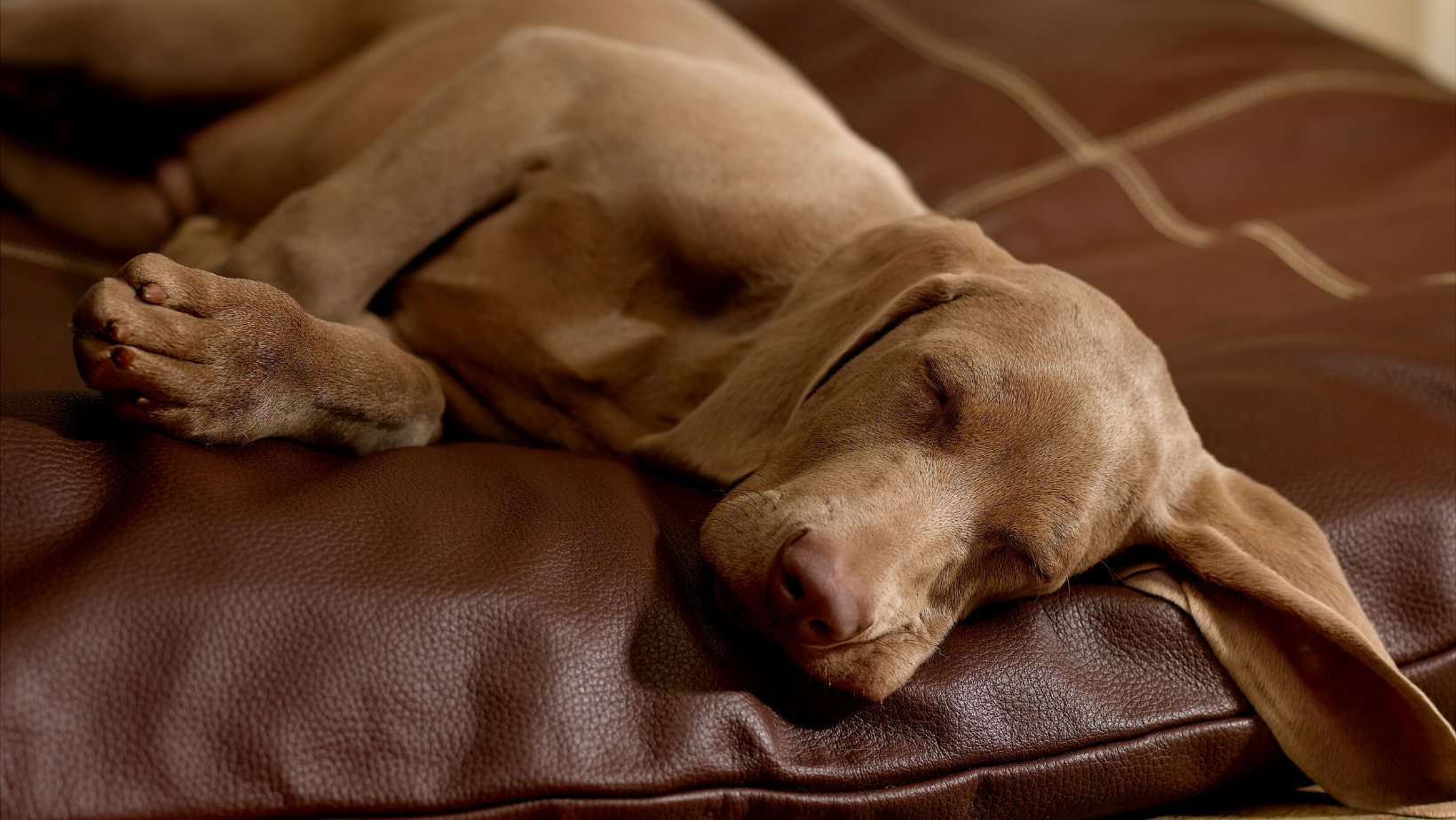
Similar to humans, dogs go through stages of light and deep sleep. They can complete two sleep cycles during a 45-minute snooze, with each cycle having a 1–5 minute window of REM sleep. Dreams happen during REM sleep, often known as rapid eye movement sleep. Your dog may perform their fantasies during this stage of sleep by wiggling their limbs or paws, pulling faces, snarling, whining, or whimpering.
When brain activity is at its highest, whimpering, moaning, and snarling are typical responses. It’s not always the case that your dog is experiencing a nightmare, although it appears tense or aggressive.
It’s impossible to predict what our cherished furry buddies are fantasizing about. Therefore, if your dog howls while they are sleeping, it is most probably just an indication of deep sleep rather than a symptom of discomfort.
2. Normal Puppy behavior
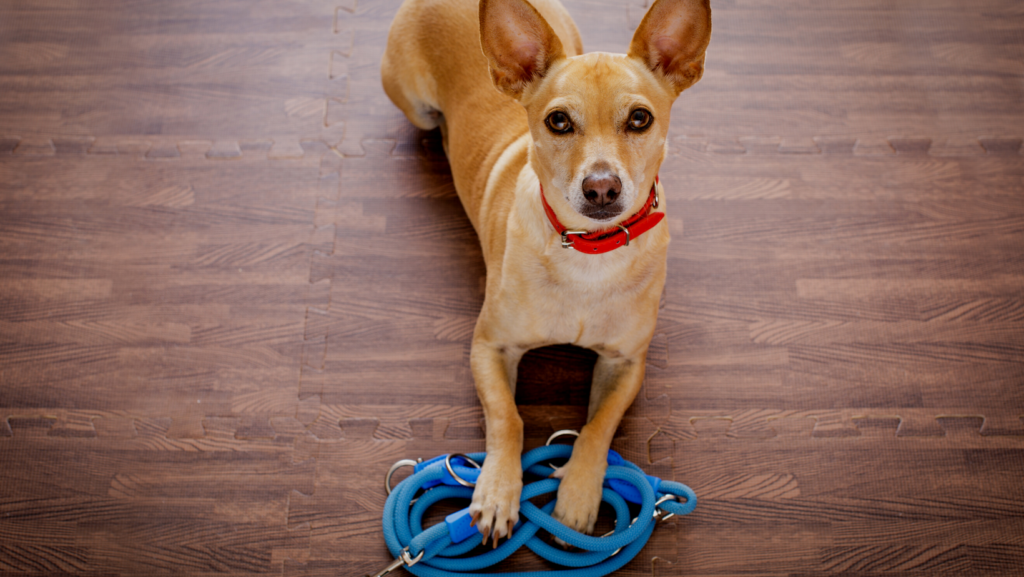
Cries and whining when sleeping is typical puppy behavior. The same week or so after being taken from their mums and pups, puppies are the noisiest. Their brain stem, which sends signals to relax muscles, may be undeveloped, making it less effective at calming their systems. Puppy whining and extreme fidgeting eventually stop on their own.
3. Indications for Toilet Breaks
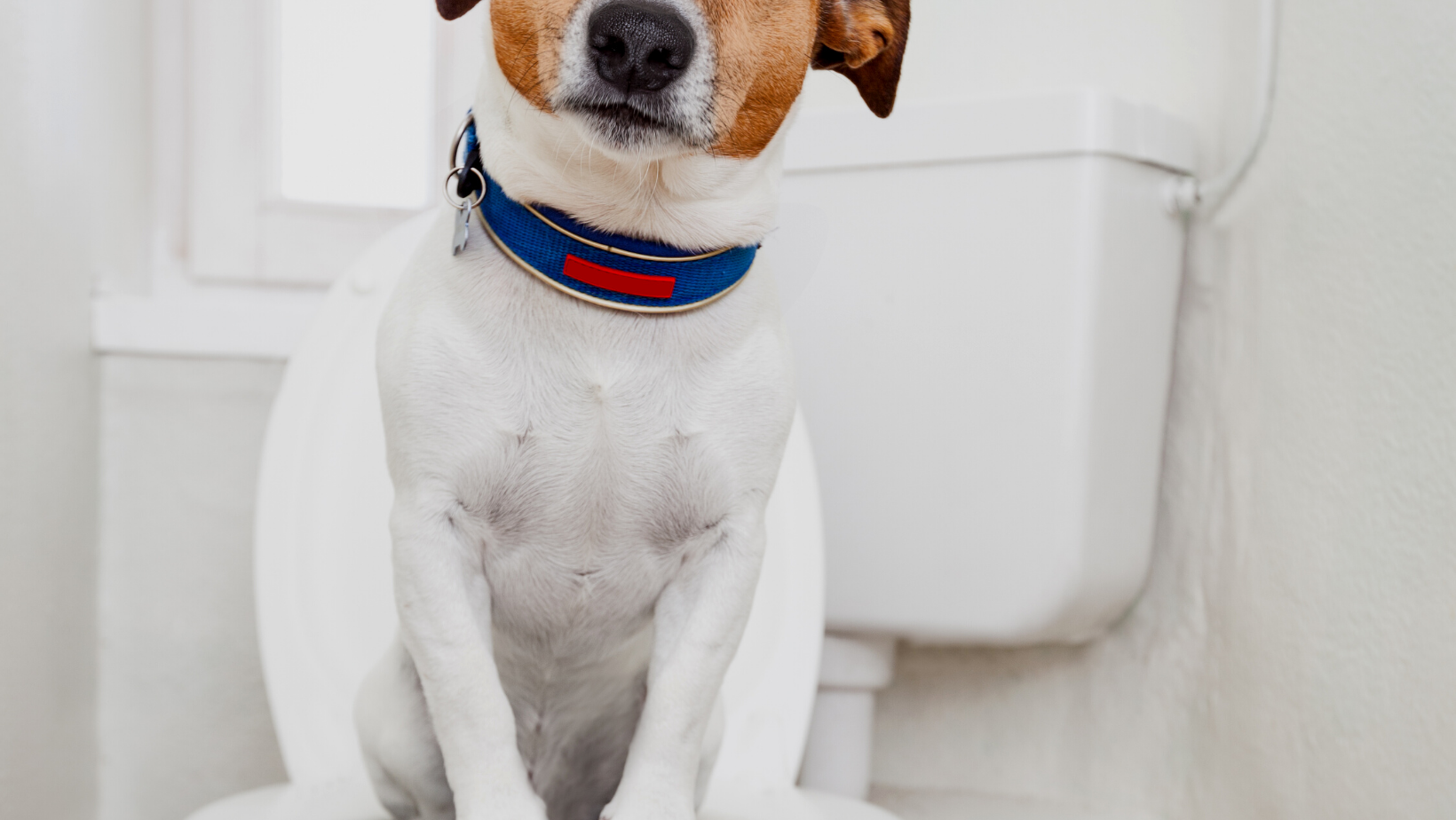
When your dog cries at night, it may be because it has to go outdoors, perhaps for a pee break. Try to exhaust your dog before bedtime by taking him on numerous walks and activities. After a bathroom break, send him to sleep once his adrenaline has been used up. Your dog will sleep soundly and peacefully on account of this.
Also Read About: Dog ate Toilet Paper: What You Should Do?
4. Hunger

An incomplete meal can be extremely uncomfortable and interfere with sleep patterns. Hence, to save your dog’s hunger, it’s crucial to give him premium, natural snacks.
Also Read: 8 Dog Food Brands To Avoid [+ 5 You Should Buy ]
Health Conditions That May Cause Your Dog to Cry in His Sleep
Other than normal physiologic responses, certain complications or disorders may trigger whining or crying in sleeping dogs. Unusual crying may indicate a health problem that needs to be treated. The following are some scenarios that could aggravate this issue:
1. REM Sleep disorder
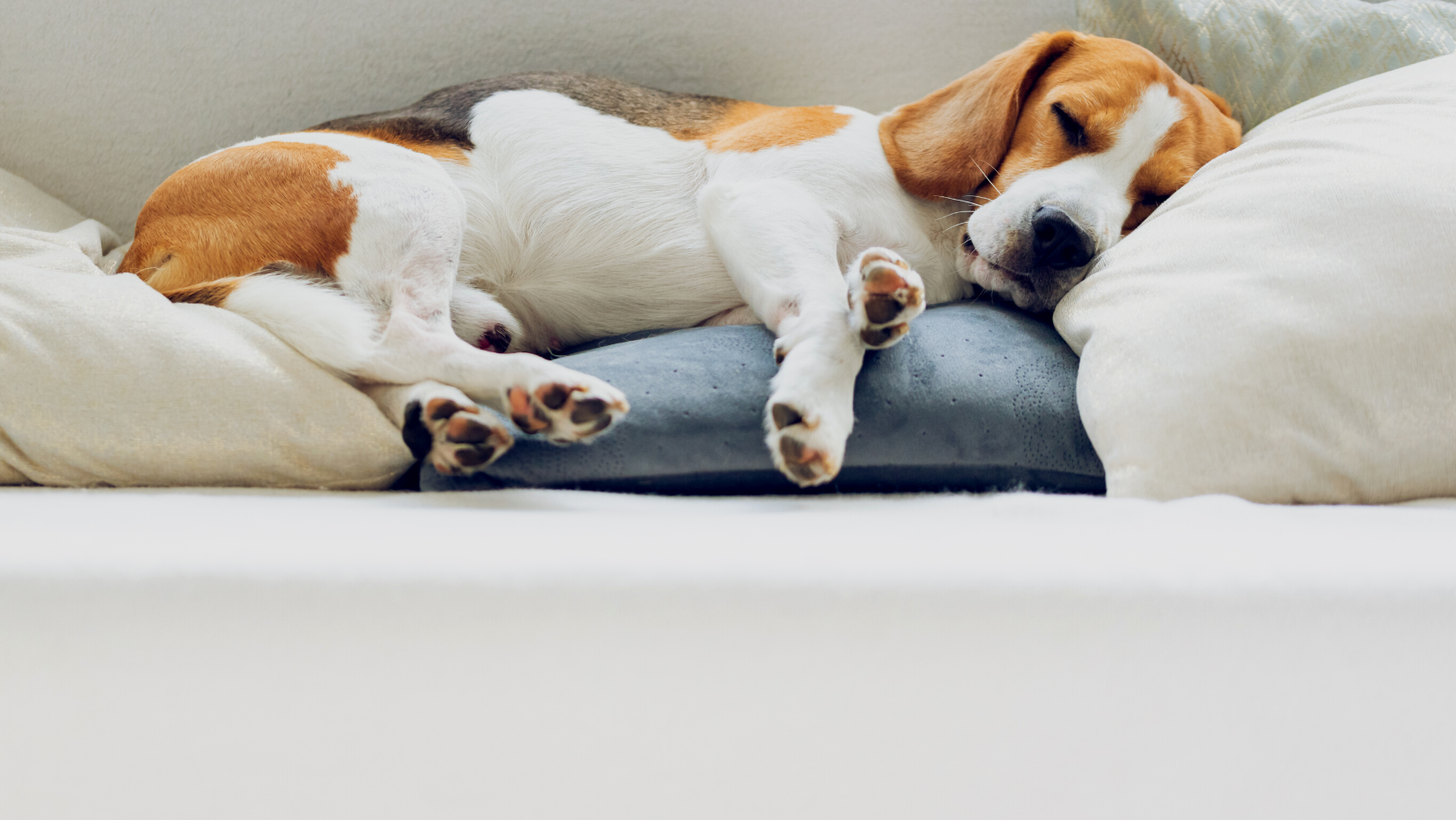
When in REM sleep, a dog with REM sleep behavior disorder does much more than move its legs. They can stand up, dash into surfaces, bite someone or something, and other situations. Both the dog and the bystanders may be at risk. When this happens, the defenses meant to keep the body from effectively enacting the dreams of the brain aren’t working effectively.
2. Pain
Although dogs are skilled at masking their pain, some tend to whine constantly. A dog in discomfort has difficulty getting the rest he needs, a decent night’s sleep, and both. If you suspect your dog’s whining during sleep may be caused by pain, bring him to the doctor for a full examination. Before looking into other potential causes of whimpering during sleep, consider pain a trigger.
3. Bloat
There are various causes of canine bloating. The discomfort becomes intolerable when the gas rises so the stomach and intestine can no longer be stretched. A bloated dog may have trouble falling asleep, especially if he lays on his stomach.
The situation is exceedingly dangerous and might easily turn into a catastrophe. Although a dog with bloat is unlikely to whine when sleeping, it would be important to pay attention if it were present together with other indicators.
4. Boredom
All dogs require adequate physical and psychological stimulation. If you can’t take your dog out to play frequently enough, he can grow bored with everyday activities. Once everyone falls asleep, and the dog begins to howl and whine for no apparent reason, that is a sign of boredom.
Rarely will dogs whine because they are expressing either of these emotions and are doing so while asleep or with their eyes shut. If boredom is the issue, more regular workout regimens will tackle the problem.
5. Separation Anxiety
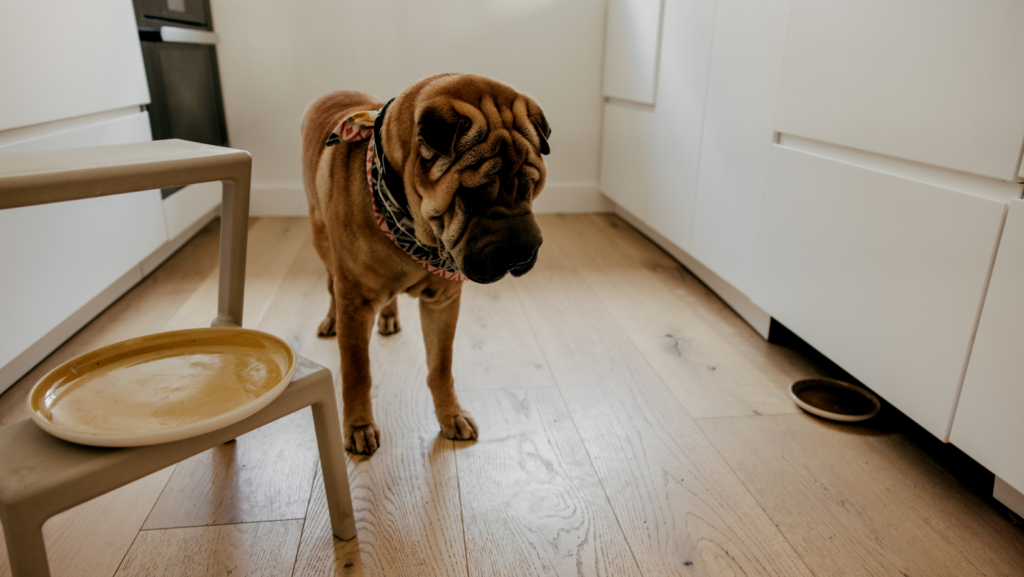
Most dogs have a strong bond with their owners and begin to cry when they are apart. If you observe indications of separation anxiety, you must begin training right away.
6. Seizures
An abrupt increase in the brain’s electrical stimulation can cause seizures. This may be followed by vocalizations, paw and face jerking, and “running” motions in the legs.
It can be difficult to tell whether your dog is reacting normally during REM sleep or experiencing a seizure because seizures seem more likely to happen in dogs as brain activity switches from one phase to another.
If you suspect your dog is experiencing frequent seizures, keep track of how your dog acts and try to record a brief clip to show your veterinarian. When you fear your dog is having a seizure, avoid poking, shaking, or waking them up because they might bite.
7. Anxiety or Fear
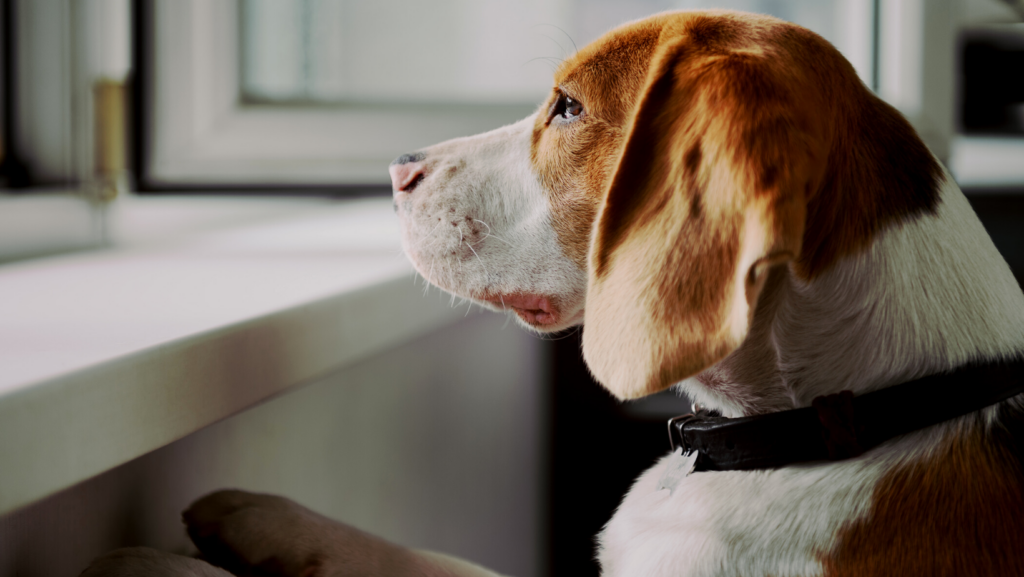
Other potential causes for your dog’s excessive sleep-related weeping include anxiety or fear. Other signs to watch out for include excessive slobbering, retching, sleepiness, restlessness, odd clawing, licking, or eating an area of skin raw, in addition to any other symptoms that change from their typical temperament or behavior.
8. PTSD (Post-traumatic Stress Disorder)
Ask about any negative life events before adopting a pup from a rescue. Dogs can experience PTSD (post-traumatic stress disorder), much like people. Even as an adult, your dog may continue to dream about these incidents.
It would be best to talk to your vet about the best course of action to treat this issue. Medications and behavioral therapies are frequently used as PTSD remedies. Your vet can suggest the ideal course for your dog’s rehabilitation.
9. Lack of training
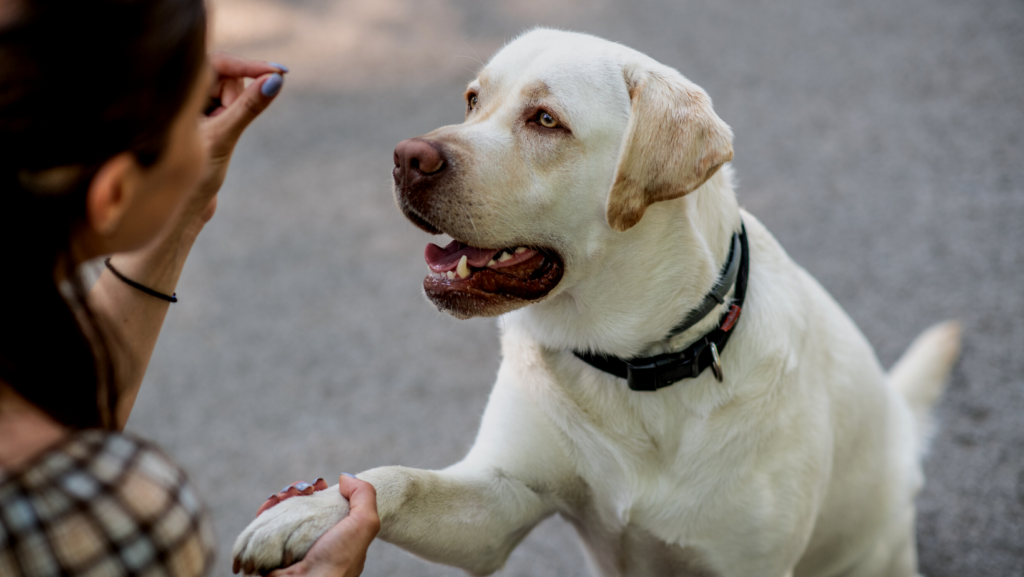
Without appropriate behavioral training, dogs who are permitted to whine at night for their lives will do so as they age. It might only be due to a lack of conditioning that your Dog continues to whine in the middle of the night. To focus on this issue collaboratively, you might wish to enlist your Dog in a behavior class or hire a dog trainer.
What Can I Do About My Dog’s Whining Throughout the Night?
There are a few things you can do to make your dog feel comfortable and secure if you’re worried about how they behave while they’re sleeping:
- Consult your vet to rule out any illnesses or conditions that could be the source of your pet’s whining while they sleep.
- To prevent health issues from contributing to sleep disturbances, ensure your Dog consumes a well-balanced diet rich in protein and nutrients, along with adequate exercise.
- Talking to your dog very softly can help them fall asleep, particularly if they appear stressed or nervous.
- A puppy crate with a nice warm bed can help your dog feel more secure if you’re worried about his movement patterns while sleeping, even more so if he’s a puppy.
FAQ’s
REM sleep disruption can have negative effects on the brain. Additionally, if you approach your Dog when engaged in a nightmare, he can unintentionally bite or claw you. Only once you are unsure if a dog is having a seizure or a dream may you try to wake him up.
Even though your Dog might just be dreaming, it starts wailing in its sleep frequently; it may indicate suffering from an injury or disease.
Any growling or wailing at nighttime is best ignored right away. This attention-seeking behavior won’t hurt your Dog as far as he’s content, and it should only last a short while.
Conclusion
The best action is to wait for your dog to awaken if he is whining while sleeping. Avoid attempting to wake up your dog. Your dog might bite you unintentionally if you startle them. If you think your pet has a horrible dream, try waking them up by calling their name gently.
Gently petting them can also calm them down and help them go to sleep again. Consult your vet immediately if you see signs of any of the illnesses mentioned above in your dog. Screen any medical conditions triggering this behavior because dogs cannot effectively convey their requirements to us.
Meet John Patterson, an accomplished Dog Trainer and a dedicated advocate for building strong human-canine relationships.With years of experience as a Professional Dog Trainer, John firmly believes that well-trained dogs are a reflection of patient guidance and unwavering care. Beyond his training skills, he finds solace in grooming and playing with dogs, nurturing their physical and emotional well-being.

